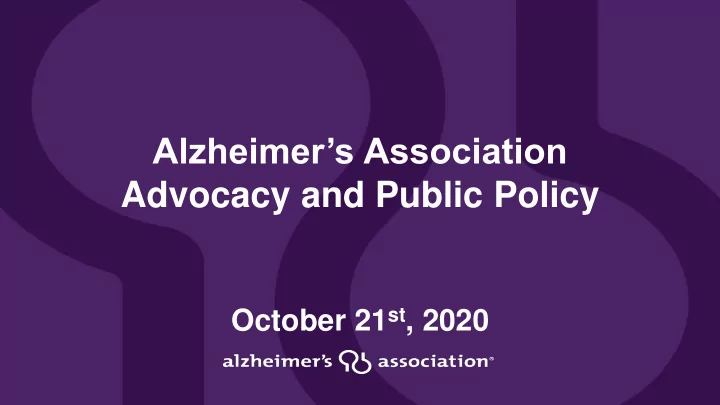

Alzheimer’s Association Advocacy and Public Policy October 21 st , 2020
Agenda • Advocacy Volunteer Structure • History • State Policy • Federal Policy • How to Get Involved
Advocacy Volunteer Structure
General Overview
Alzheimer’s Impact Movement
Nomenclature • Public Policy • Grassroots Advocacy • Government Affairs • Policy Development
Formal Advocacy Roles Alzheimer's State Alzheimer's Ambassadors Alzheimer's Congressional Champions Team Members Cultivate multifaceted, year- Develop deep, one-to-one Bring their own unique stories, round relationships with relationships with their relationships and skills to targeted state officials. assigned members of complement the work of an Congress. Ambassador.
Formal Advocacy Roles State Champions Ambassadors & ACT Members
State Champion Responsibilities
Tactics • Calling • Emailing • Letters/Fax • Scheduling a meeting • Attending their local events • Association events – Attendee – Speaker – Sponsor
Tactics Cont … • Social Media • Petitions • Submitting Testimony • Field Operations: Canvassing, pamphleting, etc. • Letters-to-the-Editor / Editorial • Television Interview / Press Conference
Online Engagement • Individuals can opt to infrequently contribute via requests by email or text message • Easiest way to sign-up is to text IMUA to 52886 • Participate in Digital Advocacy Day, submit testimony, email legislators, post to social media, or calls legislators
Phone to Action
History
Alzheimer’s Disease – A Public Health Crisis 6 th leading cause of death in the United States and only cause of death among • the top without a way to prevent it, cure it or even slow its progression • Affects 29,000 individuals over age 65 in Hawaii. 1 in 3 seniors dies with Alzheimer's or another dementia • Alzheimer’s disease has a profound effect on the 65,000 family members who provide 74 million hours of unpaid care for their loved ones in Hawaii • Family caregivers often suffer their own health crises as a direct result of the stress related to providing Alzheimer’s care • The New England Journal of Medicine reports that Alzheimer's disease is now the most expensive disease in the U.S., surpassing both cancer and heart disease. Costs are expected to skyrocket. Costs affect Medicare, Medicaid, individuals, and caregivers
Plan for Dementia Capable Hawaii • State Plan developed and released by DOH in 2014 • Plan had recommendations from a Task Force of more than 40 community & government stakeholders • Recommendations – Prevention & treatment by 2025; care quality; expand support – training, respite, legal, financial & safety; increase awareness; & data collection & monitor progress
Status of the State Plan • Limited Progress has been made • Legislators and government Agencies and Departments often don’t know what is in the plan – Executive Office on Aging is one of the important exceptions here • We need the Alzheimer’s Coordinator position • Also, we cannot wait for the Alzheimer’s coordinator position • The Time to Act is Now
Legislative Champions Rep. Mizuno Sen. Dela Cruz • • SB2102 HB2099 • Chair: Ways and • Chair: Health Means Sen. Moriwaki • SB2339, SB2340, Rep. Takayama SB2342, SB2333 • • HB1865, HB1873, Co-Chair: Kupuna HB2455, HB1867, Caucus HB1871 Sen. Wakai • Chair: Public • SB2563 Safety, Veterans, • Chair: Energy, & Military Affairs Economic • Co-Chair: Kupuna Development, and Caucus Tourism
State Advocacy History • The Alzheimer’s Association – Hawaii has long played a crucial role in state Advocacy • Since 2013 we have been active in development of the Hawaii 2025: State Plan on Alzheimer Disease and Related Dementias • Holding annual Advocacy Day events to promote awareness of the issue and the State Plan
State Advocacy History • State Alzheimer’s Coordinator position (2014-present) • Advocating for pilot program to expand dementia screening for Native Hawaiians (2019) • The ambitious Alzheimer’s Legislative Agenda (2020)
Working Family Coalition • Dependent Tax Credits • Raising the Minimum Wage ($17/hr by 2024) • Expanding Affordable Housing • Increased Access to Child Care • Expanding Kupuna Caregivers Program
Federal Advocacy History • BOLD Infrastructure for Alzheimer's Act • Health Outcomes, Planning, and Education (HOPE) for Alzheimer’s Act • National Alzheimer’s Project Plan • Alzheimer’s Accountability Act
State Policy
Nationwide State Policy Priorities (NSPP) • GOAL 1 : Increase Public Awareness, Early Detection & Diagnosis • GOAL 2 : Build A Dementia-Capable Workforce • GOAL 3 : Increase Access to HCBS • GOAL 4 : Enhance The Quality of Care In Residential Settings
Current State Advocacy • Fund the Alzheimer’s and Related Dementias Services Coordinator Position • Establish Silver Alert • Mandate First Responder Dementia Training Requirements • Expand Kupuna Caregivers Program
Federal Policy
Current Federal Advocacy • Promoting Alzheimer’s Awareness to Prevent Elder Abuse Act • Improving HOPE Act • Safeguarding LTC Campaign (Federal) • Appropriations : An additional $354 million for Alzheimer’s and dementia research at the National Institutes of Health (NIH); $20 million to implement the BOLD Infrastructure for Alzheimer’s Act at the Centers for Disease Control and Prevention (CDC)
How to Get Involved
How To Get Involved • Text IMUA to 52886 – Sign up on Phone2Action for infrequent advocacy alerts – Follow the link in the email and sign up to be an advocate on Alzimpact.org • Email me at iaross@alz.org or call me at (808)652-3380 – Share your story – Tell me your idea for a law or program
Mahalo!
Poll Time
Recommend
More recommend